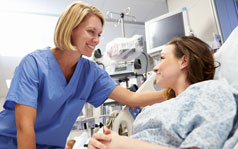Arrhythmia
What is arrhythmia?
Arrhythmia is the medical term used to describe an abnormal rhythm of the heart. The type and severity of the rhythm problem can vary in patients. The heart may beat too slowly, too quickly, or irregularly. If the heartbeat is too slow, it is called a bradyarrhythmia or bradycardia. If it is too fast, it is called a tachyarrhythmia or tachycardia. These abnormalities range from a minor inconvenience or discomfort, to a potentially life-threatening problem. A normal heart rate is between 60 and 100 beats per minute but there are many exceptions. If you are concerned, it is a good idea to keep a diary to monitor any activities or triggers you associate with an arrhythmia episode.
.jpg?sfvrsn=6c7b1c33_1)
.jpg?sfvrsn=cd5fabb4_1)
What are the different types of arrhythmias?
The most common arrhythmias are:
- Atrioventricular-nodal re-entry tachycardia (AVNRT) where dual atrioventricular-nodal conduction is present.
- Atrioventricular re-entry tachycardia (AVRT) where an accessory pathway between the atrium and the ventricle is present, such as in Wolff Parkinson White-syndrome.
- Typical atrial flutter where a circle propagates around the right atrium.
- Atrial tachycardia where there is a loop elsewhere in the atrium or a small focus is giving the extra impulses.
What are the symptoms of arrhythmia?
The symptoms of a slow heartbeat include:
- Fatigue
- Dizziness
- Light-headedness
- Fainting or near-fainting spells
The symptoms of a rapid heartbeat include:
- Palpitations
- Dizziness
- Light-headedness
- Fainting or near fainting
What are the causes of this condition?
Many things can lead to, or cause, an arrhythmia including:
- Coronary artery disease, other heart problems, and previous heart surgery: narrowed heart arteries, a heart attack, prior heart surgery, heart failure, and other heart damage.
- High blood pressure: this increases your risk of developing coronary artery disease. It may also cause the walls of your heart to become stiff and thick.
- Congenital heart disease: heart abnormality from birth may affect your heart's rhythm.
- Thyroid problems: an overactive or underactive thyroid gland.
- Drugs and supplements: some over-the-counter cough and cold medicines, and some prescription drugs.
- Diabetes: your risk of developing coronary artery disease and high blood pressure greatly increases with uncontrolled diabetes.
- Sleep apnoea: this disorder, in which your breathing is interrupted during sleep, can increase your risk of a slow heart rate and other arrhythmias.
- Electrolyte imbalance: substances in your blood called electrolytes — such as potassium, sodium, calcium and magnesium — can affect your heart and contribute to arrhythmia if their levels are too high or too low.
- Dehydration: not drinking adequate amounts of fluids each day.
- Drinking too much alcohol.
- Caffeine or nicotine use: caffeine, nicotine and other stimulants can cause your heart to beat faster.
- Drugs: illegal drugs, such as amphetamines and cocaine, may seriously affect your heart, leading to arrhythmias and even sudden death.
How is arrhythmia diagnosed?
A heart arrhythmia can be detected by regular pulse checks and will only be diagnosed following a check-up with your doctor.
If your doctor is concerned, you will be referred to a consultant cardiologist with expertise in arrhythmia, for further evaluation and testing. This specialist is known as an electrophysiologist.
The following tests may be carried out:
- ECG (electrocardiogram): records the heart rhythm and activity on a moving strip of paper. This is often the first test you will have, but it only captures information at that specific moment in time, so you may need additional tests.
- 24/48 hour ECG monitor: you may be asked to wear a portable ECG monitor for one or two days to record information on your heart’s activity over an extended period of time. This may be because the initial ECG was inconclusive.
- Echo (echocardiogram): an echo is a test which uses an ultrasound scan to look at the structure of your heart.
- Event monitor: this is a device that is used over a period of time to record the heart activity when you are experiencing an arrhythmia. Some event monitors are implanted under the skin for several months.
- Exercise stress test: this test takes a recording of your heart rate and rhythm using an ECG, while you are exercising on a treadmill. Exercise can raise your heart rate which may help to show any arrhythmias.
- EP study (electrophysiology study): an EP study is a procedure used to examine the electrical function of the heart, and irregularities in your heart rhythm. It is performed to find out why your heart beats too quickly or too slowly, or why it does not beat in a regular rhythm. It helps identify the location of the abnormal electrical signals in your heart.
- Coronary angiogram: this is a procedure which examines the coronary arteries in your heart to see if there is any narrowing caused by heart disease. It uses dye and an x-ray to show whether your blood is flowing freely, or if your arteries are narrowed or blocked. It can also show any problems in the chambers of your heart or heart valves. This test is also sometimes called cardiac catheterisation.
How can I prevent it?
To prevent arrhythmia, it's important to live a heart-healthy lifestyle, to reduce your risk of heart disease. A heart-healthy lifestyle may include:
- Eating a heart-healthy diet
- Increasing your physical activity - it is recommended to exercise for 30 minutes per day, to a moderate intensity level
- Avoiding smoking
- Keeping a healthy weight
- Drinking enough water each day to avoid becoming dehydrated
- Limiting or avoiding caffeine and alcohol
- Reducing stress levels
- Using over-the-counter medications with caution, as some cold and cough medications contain stimulants that may trigger a rapid heartbeat
What is the treatment for arrhythmia?
Treatment for arrhythmia is dependent on the type of arrhythmia your cardiologist has diagnosed.
The treatments may include:
- Lifestyle/risk factor modification
- Management with medication
- Cardioversion if indicated
- Electrophysiology study / ablation procedure if indicated
Medications
- Anti-arrhythmic drugs to return your heart to a normal rhythm
- Drugs to control the heart rate
- ‘Warfarin’ or aspirin which reduces the risk of clots forming or strokes
Lifestyle changes
- Stop smoking
- Drink sensibly
- Reduce or stop taking caffeine (tea/coffee/coca-cola)
- Avoid taking medications, herbal remedies or supplements which contain stimulants
Cardioversion
During cardioversion, an electric shock is delivered to your chest wall that allows your heart to return to a normal rhythm.
Ablation
Ablation is the delivery of high-frequency electrical energy to certain areas of tissue in the heart “disconnects” the abnormal rhythm.
Pacemaker
Pacemaker is a small device implanted into the chest wall. The device sends small electrical impulses to the heart allowing it to maintain a normal heart rhythm. It is mostly used for patients who have a low heart rate.
Implantable cardioverter defibrillator (ICD)
ICD is the implantation of an electrical device in the chest cavity. The device monitors your heart rhythm and when the abnormal rhythm occurs it delivers a ‘shock’ to the heart wall to return the heart beat to normal.







.jpg?sfvrsn=bc97231b_1)

